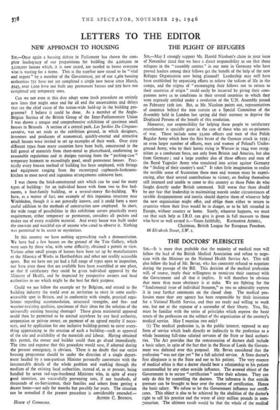Sns,—May I strongly support Mr. Harold Nicolson's claim in your
issue of November 22nd that we have a direct responsibility to see that those refugees in the " assembly centres " in our zone in Germany who have proved leaders among their fellows get the benefit of the help of the new Refugee Organisation now being planned? Leadership may well have been established by organising efforts to relieve the tedium of life in the camps, and the stigma of " encouraging their fellows not to return to their countries of origin " could easily be incurred by giving their com- panions news as to conditions in their several countries to which they were expressly entitled under a resolution of the U.N. Assembly passed on February 12th last. But, as Mr. Nicolson points out, representatives of countries behind the iron curtain on a Special Committee of the Assembly held in London last spring did their outmost to deprive the Displaced Persons of the benefit of this resolution.
Moreover, our responsibility for helping these people to satisfactory resettlement is specially great in the case of those who are ex-prisoners of war. These include some 33,000 officers and men of that Polish Regular Army which bore the first brunt of the German attack in 1939 ; an even larger number of officers, men and women of Poland's Under- ground Army, who by their heroic rising in Warsaw in 1944 won recogs nition as a combatant force, not only from Britain and America, but also from Germany ; and a large number also of those officers and men of the Royal Yugoslav Army who translated into action against Germany the " finding of their country's soul." It takes little imagination to realise the terrible sense of frustration these men and women must be experi- encing, after their several contributions to victory, on finding themselves still interned and unable to come to this country as those Poles do who fought directly under British command. Still worse that there should be any fear that leadership in maintaining morale under circumstances of terrible disappointment and inertia should deprive them of whatever help the new organisation might offer, and oblige them either to return to countries where their lives would be in danger, or to be left stranded in Europe, without country or home. Surely, whatever happens, we must see that such help as I.R.O. can give is given in full measure to those who have so well earned it.—Yours faithfully, KATHARINE ATHOLL, Chairman, British League for European Freedom.
66 Elizabeth Street, S.W. r.


































 Previous page
Previous page